The advent of dental implants have given patients a new world in treatment options today to replace missing teeth. However, this deceptively simple dental option requires skill in order to properly execute and restore in a manner that would be functional for you for many years. This article will explain why implants cost what they do as well as why you should look for a dental professional who has extensive training.
What Is a Tooth Implant?
.2010051537550.jpg) When your dentist tells you that you should get an implant, it is important for you to understand what is involved in terms of time and expense before signing on to the dotted line for this treatment option - for it is more than simply putting a “screw into the bone”. When we talk about an implant, you should understand that there are multiple components and steps involved and that it does require time.
When your dentist tells you that you should get an implant, it is important for you to understand what is involved in terms of time and expense before signing on to the dotted line for this treatment option - for it is more than simply putting a “screw into the bone”. When we talk about an implant, you should understand that there are multiple components and steps involved and that it does require time.
The components of an implant include:
- The implant body or fixture, which is placed in the bone
- The implant crown
- An abutment on to which the implant crown is connected
Each of these components have its own associated fee. To use the analogy of hanging a picture on a wall, these are the nail, picture hanger, and picture. Sometimes the picture hanger (abutment) and the picture (crown) come together as one piece. The implant fixture can cost anywhere between $1,600 - $3,000; the implant crown $1,200 - $3,000; and the abutment $275 - $400.
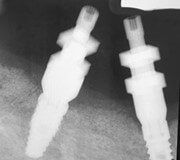 As mentioned previously, an implant is much more than screwing an implant into bone. You need to consider that the implant is being placed into a three dimensional space and therefore it is crucial to correctly position the implant body within this space. A poorly positioned implant could have detrimental forces and stresses placed on them resulting in failure. The x-ray image on the right shows two implants converging without a parallel path of draw.
As mentioned previously, an implant is much more than screwing an implant into bone. You need to consider that the implant is being placed into a three dimensional space and therefore it is crucial to correctly position the implant body within this space. A poorly positioned implant could have detrimental forces and stresses placed on them resulting in failure. The x-ray image on the right shows two implants converging without a parallel path of draw.
How Much Does a Tooth Implant Cost?
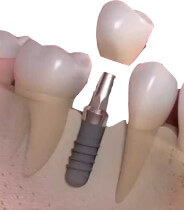 On average, a single implant fixture that requires no additional auxiliary surgical procedures can cost between $1,600 - $3,000. The abutment (if needed) and crown can add an additional $1,200 to $3,000. So the total cost of a single implant can range anywhere between $2,800 and $6,000.
On average, a single implant fixture that requires no additional auxiliary surgical procedures can cost between $1,600 - $3,000. The abutment (if needed) and crown can add an additional $1,200 to $3,000. So the total cost of a single implant can range anywhere between $2,800 and $6,000.
There are various dental implant companies available and depending upon which company’s implant is used, the cost can fluctuate. In most cases, these costs would be your out-of-pocket expense. Your insurance company may cover a portion of the expense and will vary depending upon your dental plan. Cost of the procedure may be higher depending upon your circumstance and multiple implants will increase the cost.
How Much Do Multiple Dental Implants Cost?
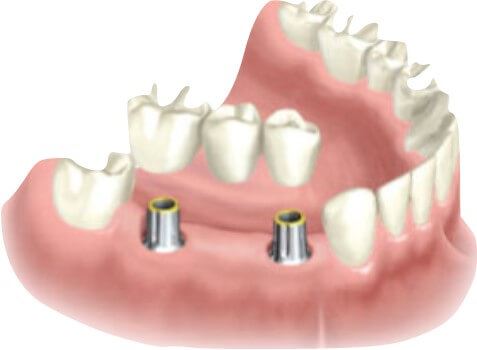 If you are missing more than one tooth, you may require multiple implants. Cost of multiple implants vary depending upon how many teeth are missing and number of implants needed. There is a common misconception that an implant is needed for every missing tooth. Often in a long span, where three consecutive teeth are missing, only two implants may be needed.
If you are missing more than one tooth, you may require multiple implants. Cost of multiple implants vary depending upon how many teeth are missing and number of implants needed. There is a common misconception that an implant is needed for every missing tooth. Often in a long span, where three consecutive teeth are missing, only two implants may be needed.
However, in order to restore three teeth with two implants, a pontic or “dummy tooth” would be needed connecting the two implants. Cost may vary depending upon your individual needs, additional associated costs, number of teeth units needed, and materials used.
How Much Do Full Dental Implants Cost?
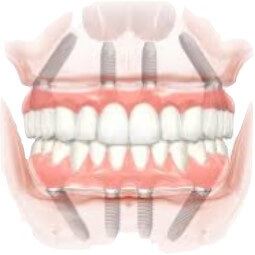 Recently, many patients have opted for implant supported dentures. These patients typically have multiple missing teeth and those that are remaining have a very poor prognosis. These patients typically do not want to have removable dentures and want something that is fixed. The other category of patients includes those who have dentures and do not like them.
Recently, many patients have opted for implant supported dentures. These patients typically have multiple missing teeth and those that are remaining have a very poor prognosis. These patients typically do not want to have removable dentures and want something that is fixed. The other category of patients includes those who have dentures and do not like them.
You can expect to pay between $7,000 - $20,000 per arch for implant supported dentures, in addition to the cost of the dental implants. This type of restoration usually requires between 4 to 6 implants per arch. Most commonly, hybrid dentures are made for the lower jaw because the lower dentures tend to be the least retentive due to muscle movements of the cheeks and tongue.
Often times, an additional treatment denture or duplicate denture is needed to determine proper implant placement. Although there are many benefits to this type of denture, the down side is that food and debris tend to collect under the denture between the implants and require meticulous home care. Only your dentist will be able to unscrew these dentures from the implants and should do so at least once a year for maintenance.
A Lower-Cost Alternative to Full-Mouth Dental Implants
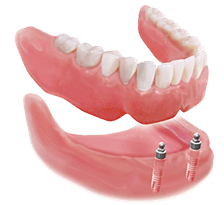 If the cost of full-mouth dental implants for a hybrid denture is prohibitive, and you don’t mind having a denture that is still removable (albeit with better retention), then an implant assisted over-denture may be a good option for you. These require between 2 to 4 implants and are most common for the lower jaw. These can range between $5,000-$10,000 on top of the cost of the implants. Higher fees can be due to the need for a metal substructure processed into the denture for added strength.
If the cost of full-mouth dental implants for a hybrid denture is prohibitive, and you don’t mind having a denture that is still removable (albeit with better retention), then an implant assisted over-denture may be a good option for you. These require between 2 to 4 implants and are most common for the lower jaw. These can range between $5,000-$10,000 on top of the cost of the implants. Higher fees can be due to the need for a metal substructure processed into the denture for added strength.
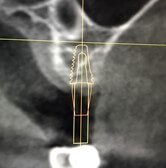 In this case, the over-denture will “snap” onto the implants and provide better retention than conventional dentures. Although is it not as permanent as the previous option, this will allow for better home care and accessibility to clean around the implants and under the denture.
In this case, the over-denture will “snap” onto the implants and provide better retention than conventional dentures. Although is it not as permanent as the previous option, this will allow for better home care and accessibility to clean around the implants and under the denture.
The Dental Implant Process
Radiographic Imaging
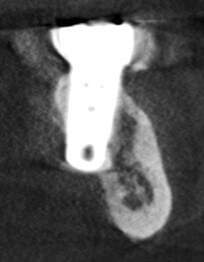 Before an implant can be placed, at the very least, your dentist will need to get an x-ray image of the site(s); preferably they should be doing a CBCT (Cone Beam CT) image of the site(s). A conventional x-ray image will only give a two dimensional image of a three dimensional object and there are many anatomical structures within the skull that must be avoided for successful implant placement. The CBCT image will also allow for proper evaluation of bone density and demensions.
Before an implant can be placed, at the very least, your dentist will need to get an x-ray image of the site(s); preferably they should be doing a CBCT (Cone Beam CT) image of the site(s). A conventional x-ray image will only give a two dimensional image of a three dimensional object and there are many anatomical structures within the skull that must be avoided for successful implant placement. The CBCT image will also allow for proper evaluation of bone density and demensions.
Because an implant needs to be placed into a three dimensional space, a CBCT would allow for the proper implant planning for position, depth, and angulation within that space. This helps fulfill the old adage, “Measure twice, cut once.” Once the implant position is determined from the CBCT image, a surgical guide is made providing a precise template for the placement of the implant.
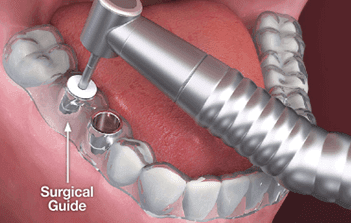 Unfortunately, the cost of these much needed diagnostic and treatment tools are additional and depending upon how many and what the dentist requires, can cost between $25 - $500. Proper imaging and planning will help avoid situations like what we see in the image to the right where the implant is angled such that the bottom is protruding through the bone
Unfortunately, the cost of these much needed diagnostic and treatment tools are additional and depending upon how many and what the dentist requires, can cost between $25 - $500. Proper imaging and planning will help avoid situations like what we see in the image to the right where the implant is angled such that the bottom is protruding through the bone
Teeth Extraction
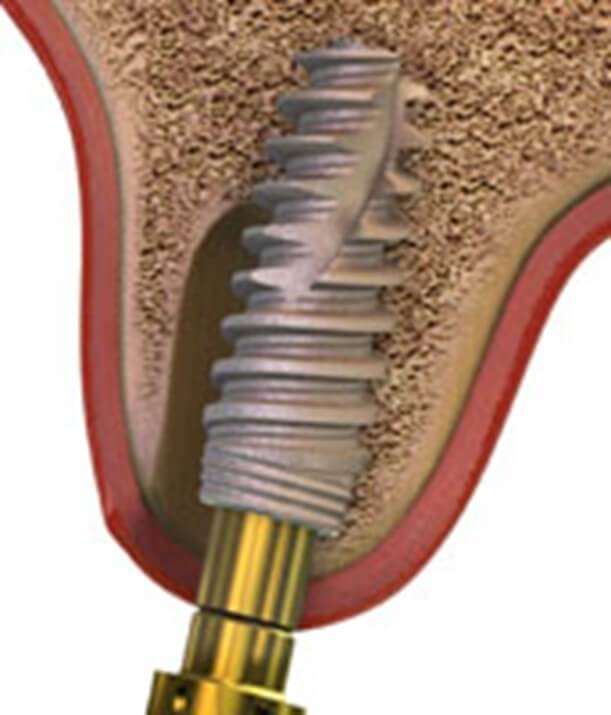 Any teeth that need to be extracted prior to implant placement are an additional expense, and depending upon the complexity of the extraction, the cost will vary. On average, a simple extraction can cost between $175 - $300. Surgical extractions can cost $275 - $500. If the extraction site is favorable, sometimes it is possible to place the implant at the same time a tooth is extracted. In these situations, additional auxiliary procedures may be needed such as bone or gum grafting to build up and replace what may have been lost over time.
Any teeth that need to be extracted prior to implant placement are an additional expense, and depending upon the complexity of the extraction, the cost will vary. On average, a simple extraction can cost between $175 - $300. Surgical extractions can cost $275 - $500. If the extraction site is favorable, sometimes it is possible to place the implant at the same time a tooth is extracted. In these situations, additional auxiliary procedures may be needed such as bone or gum grafting to build up and replace what may have been lost over time.
Grafting
There may be a need for grafting after extraction or implant placement. Bone grafting is a procedure where materials that will stimulate bone fill placed into the surgical site to fill in spaces that would otherwise be filled in with gum tissue. In the case of
The cost for bone grafting for ridge preservation procedure can range between $700 - $1,600 per site. Grafting procedures for the purpose of filling in voids, can range between $625 - $950 per site. The cost of bone material may vary depending upon the source of bone and how much is needed, but generally range between $600 - $800 per site. These include cadaver, cow, or synthetic. Harvesting your own bone is another option and can range between $500 - $1600.
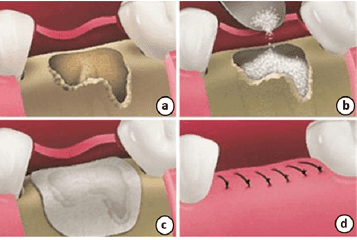 In addition to using material that will build up the bone, sometimes a barrier membrane (C) may be needed to cover and prevent healing gum tissues from infiltrating the graft material and causing the material to be rejected. These membranes can range between $420 - $1100 per site.
In addition to using material that will build up the bone, sometimes a barrier membrane (C) may be needed to cover and prevent healing gum tissues from infiltrating the graft material and causing the material to be rejected. These membranes can range between $420 - $1100 per site.
In some instances, implants may be needed in the posterior portion of the upper jaw, where the sinus may be large and therefore there may not be enough bone height to place implants. In these cases, a sinus lift surgery may be needed to raise up the floor of the sinus and build more bone either before or at the time of implant placement. Two ways in executing this procedure are either via internal lift or lateral window. Sinus grafting procedures can average between $2,100 - $4,100 in addition to the cost of materials, which range between $600 - $800 per site.
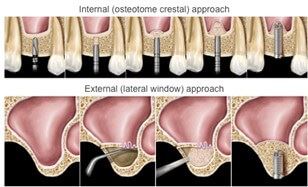 Gum grafting may also be needed to build up the amount of gum either for aesthetic reasons or to protect the longevity of the implant. These can range between $400 - $1,500 depending upon the goal of the procedure.
Gum grafting may also be needed to build up the amount of gum either for aesthetic reasons or to protect the longevity of the implant. These can range between $400 - $1,500 depending upon the goal of the procedure.
Do Dental Implants Work for Everyone?
Implants do not have a 100% success rate, however there are several aspects that should be taken into consideration to ensure a successful outcome. As we see in the x-ray image on the left, the implant and restoration are stable, however there is bone loss around the implant. Therefore there may be a successful restoration, but we can question whether there is overall success. Or, we may have success with both the implant and the restoration, but there may be an esthetic failure, as seen on the right.
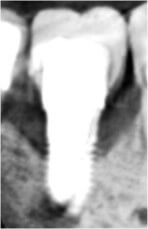 One factor that is not under the control of your dentist is any systemic medical conditions (osteoporosis, diabetes, etc) and social habits (smoking, etc) that you may have. Another significant factor is the condition of your bone and gums. Based on available research, in individuals that have a history of gum disease, we know the bacteria that causes gum disease are still present in the mouth even after the teeth are extracted and therefore could also affect the success of the implants.
One factor that is not under the control of your dentist is any systemic medical conditions (osteoporosis, diabetes, etc) and social habits (smoking, etc) that you may have. Another significant factor is the condition of your bone and gums. Based on available research, in individuals that have a history of gum disease, we know the bacteria that causes gum disease are still present in the mouth even after the teeth are extracted and therefore could also affect the success of the implants.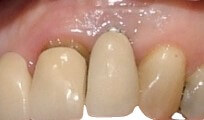 We also know that excessive biting forces placed on implants can lead to implant failure. Implant failure can range from fracture of the restoration, screw breakage, implant fracture, or de-integration of the implant.
We also know that excessive biting forces placed on implants can lead to implant failure. Implant failure can range from fracture of the restoration, screw breakage, implant fracture, or de-integration of the implant.
What Kind of Dentist Does Tooth Implants?
As mentioned above, the total cost of your implant can vary depending upon whether ancillary surgical procedures are needed to successfully place your implant. The ideal professional who should be placing your implant is a dental surgeon, either an oral surgeon or periodontist, both of whom have had multiple years of formal surgical training beyond dental school. Of the two, a periodontist is additionally trained in gum tissue management and plastic surgery of the gums. As far as restoring your implant, either your general dentist who has had training in implants or, preferably, a prosthodontist, would be your ideal professional. There is, however, a small group of professionals who have been trained in both periodontics and prosthodontics. These dual trained professionals, like Dr. Scott Nakamura, understand both the surgical as well as the restorative aspects of dental implants.
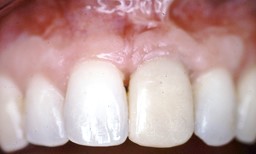 Because of their additional training and expertise, seeing a specialist may incur higher fees. However, because of the complications that can be associated with implants, it is best to have a specialist place and restore them. Additionally, for the long term maintenance of your implant it is important that your dental professional is able to provide you with regular dental cleanings. If you are thinking about having an implant, call Integrated Dental Care today and have Dr. Scott Nakamura, who is trained in both periodontics and prosthodontics evaluate you for your dental implant and give you the smile you deserve.
Because of their additional training and expertise, seeing a specialist may incur higher fees. However, because of the complications that can be associated with implants, it is best to have a specialist place and restore them. Additionally, for the long term maintenance of your implant it is important that your dental professional is able to provide you with regular dental cleanings. If you are thinking about having an implant, call Integrated Dental Care today and have Dr. Scott Nakamura, who is trained in both periodontics and prosthodontics evaluate you for your dental implant and give you the smile you deserve.

